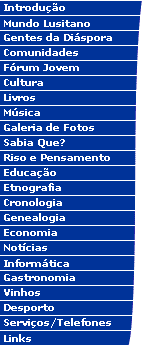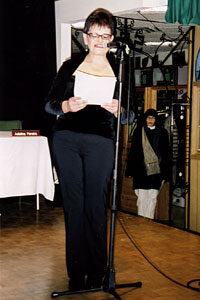




|
Adiaspora.com is a project consisting of a bilingual web site in Portuguese and English that sets out to diffuse Lusitanian culture in the hope to bridge the divides between the homeland and the numerous luso communities throughout the world. After the resounding success our site has met with during its first year on the Internet, we now feel it is time to branch out into other satellite projects that may in some way complement and enrich the original project. But alluding to the name of our site, Adiaspora.com, which in itself is revealing as to the its purpose and content, I would like to read you a poem by one of our young collaborators Karina Linhares Paula, a Brazilian and herself likewise a product of the Lusitanian diaspora. The original poem was written in Portuguese and subsequently translated by Adiaspora.com. I shall proceed to recite it in both idioms. Diáspora O ser humano em toda a sua existência Diaspora Man throughout all his existence It seems that diasporas or migrations are an essential, integral and natural part of life, of mankind's destiny and that of the tiny blue planet that houses us, here on the far corner of the Milky Way. Since time immemorial Diasporas have been prophesied in Sacred Writings like the Bible and have been ever present in the making of history. Ultimately, it seems as if some all knowing invisible hand stirs up the individual and the collective impelling us to move on and on and on, mapping out on the earth's surface an inner and outer journey that must be made in order to fulfill the evolutionary plan for the species and the planet itself. We all travel or migrate in some way or another; in the eternal pursuit of happiness and the bettering of ourselves and our own, in believing somehow that on the other side the grass will be greener, as our inner selves urge us to press ever forward as we go about the daily business of living, thus crisscrossing the matrix of space, time and history. In the end these migrations or diasporas have always been none other than a quest for the unknown, the unknown, the promise of better days ahead, a better life, ultimately the good, and an escape from hardship, persecution, unhappiness and ultimately all things bad. Portugal as a geographical entity possessed all the physical characteristics that portended a diaspora, in this case set in motion to a large extent by the 15th century navigators. Bordered on three sides by ocean, its people standing on the earth's edge sought on the far horizon over the glimmering waters their dream of the land of plenty wherein ran milk and honey and where there were treasures for the taking far beyond anyone's wildest dreams, right there over the sea beyond the watery realms of the menacing sea monsters that so afflicted the imaginary of the times. And so they set out in their little ships bopping on the open waters like walnut shells adrift in a creek. And so it came to pass that we are here, there and everywhere. Now, however, we are faced with yet another kind of journey, the one we make as an individual in the context of universality and another we make as a Lusitanian collective. These are no longer physical but rather intellectual and spiritual journeys whereby we seek to come to terms with our individual and collective identities. What does it mean these days to be Portuguese or a luso-descendent? What does it signify to each and every one of us to be part of a luso community? What relevance or importance is there in being Lusitanian? How does this affect my life and that of my children and my children's children. Does it demand that we be all polyglots and speak various idioms, especially Portuguese, or can I be Lusitanian without having any reasonable command of the language itself? How do I place myself within a larger multicultural context that is fast taking over most societies worldwide or do these diverse socio-cultural influences that I am part of mean I have to give up on being a Lusitanian? Why is it that I have been taught some wild, mythical sometimes somewhat kitsch version of Portuguese culture when, upon visiting modern day Portugal I have found life there to be vastly different from this sentimental, dreamy and nostalgic notion of the motherland that seems to proliferate in amongst our immigrant communities? Might the fact that my offspring will more than likely not read, write and converse in Portuguese but in some other language diminish Lusitanian culture in some measure? All these questions that have at some time or another assailed us as products of the Lusitanian diaspora, bring to mind that singular statesman, thinker and man of goodwill, the late Leopold Senghor of Senegal who upon discovering that his family name derived from the Portuguese word "Senhor" deduced that somewhere in his ancestry miscegenation had got the upper hand and introduced the Portuguese element into his bloodline. "A minha gota de sangue Português" - My drop of Portuguese blood - about which he so sublimely wrote, touching upon how that tiny drop of blood, along with all the others, in his case from dark Africa, made him what he was, one unto himself and unto the world at large. Basically, I think that what really is important is to be aware that the Portuguese element in all of us, our very own drop of Portuguese blood, with all its cultural and genetic ramifications and consequences, makes for the individual we are, along with everything else we may have inherited or acquired along the way. We would not be the same without it. We would not be the individuals and the collectives we are without it. That like a minute sub atomic quantum particle making up the colours of a singular rainbow, our drop of Portuguese blood - a minha gota de sangue português- contributes to my uniqueness and that of the society and world I inhabit. Perhaps it is not all that important that I secure
the purity of the language, perhaps it is of no great import that
I am not all that well versed in Portuguese history and culture
for metamorphosis and miscegenation seem to be part of the Creator's
Vast Eternal Plan, but what I would like… is to have the
right to make the choice… to elect to speak Portuguese if
I so desire, to study and assimilate the culture if I so wish,
to tell my children and my children's children of it if I so deem
it and to have that choice made available to me. To have that
choice made available to me ….and to all the peoples of the
Lusitanian diaspora constitutes our main objective at Adiaspora.com
in our role as an active agent in the dissemination of our Portuguese
cultural heritage. |

